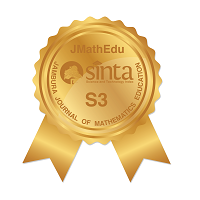Deskripsi Kemampuan Pemahaman Konsep Matematika Siswa pada Materi Sistem Persamaan Linear Tiga Variabel
Abstract
This article discusses describing the ability to understand a student's mathematical concepts in the material of a three-variable system of linear equations. The strategy used is descriptive qualitative. The data sources of this research are the results of tests and interviews. The research subjects from a total of 35 students of class X MAS AL-Falah Limboto Barat who were selected based on the results of student's understanding of mathematical concepts on the material of a three-variable system of linear equations, namely in each category one student was selected to represent each category. The data collection technique was carried out by means of an essay test as a supporting instrument and an interview as the main instrument. Essay test to obtain data on student's ability to understand mathematical concepts in terms of 3 indicators, namely; (1) restate a concept, (2) provide examples instead of examples, (3) apply concepts or algorithms in problem-solving. The results of the study show that the ability to understand student's mathematical concepts is still classified in the low category
Keywords
Full Text:
PDFReferences
Tahir, "The Effect of Learning Styles on Students' Mathematical Communication Ability" Journal of Maldives: Journal of Mathematics Education IKIP Veteran Semarang, Vol. 5, No. 1, 2021.
M. Rismawati. A. S. R. Hutagaol, "Analisis Kemampuan Pemahaman Konsep Matematika Mahasiswa PGSD STKIP Persada Khatulistiwa Sintang" Jurnal Pendidikan Dasar PerKhasa, Vol. 4, No. 1, 2018.
Tahir. Marniati, "Analisis Kemampuan Pemahaman Konsep Matematika dan Miskonsepsi Matematis Siswa SD Negeri 1 Lalolae" Jurnal Silogisme: Kajian Ilmu Matematika dan Pembelajarannya, Vol. 6, No. 2, 2021.
A. Tatu, S. Ismail, R. Resmawan, I. Djakaria, K. Usman, and D. R. Isa, "Kemampuan Siswa dalam Mengaitkan Objek Matematika pada Soal Pola Bilangan" Euler J. Ilm. Mat. Sains dan Teknol., vol. 9, no. 2, pp. 141-151, Dec. 2021, doi: 10.34312/euler.v9i2.12505.
N. Purwanto, Psikologi Pendidikan, Bandung: PT Remaja Rosdakarya, 2007.
A. P. Fajar. Kodirun. L. A. Suhar, "Analisis Kemampuan Pemahaman Konsep Matematis Siswa Kelas VIII SMP Negeri 17 Kendari" Jurnal Pendidikan Matematika, Vol. 9, No. 2, 2018.
Y. Kartika, "Analisis Kemampuan Pemahaman Konsep Matematis Peserta Didik Kelas VII SMP pada Materi Bentuk Aljabar" Jurnal Pendidikan Tambusai, Vol. 2, No. 4, 2018.
A. Safi'i. H. Bharata, "Hubungan Kemampuan Pemecahan Masalah dan Pemahaman Konsep Matematis terhadap Kemampuan Computer Self-Efficacy, JKPM (Jurnal Kajian Pendidikan Matematika, Vol. 6, No. 2, 2021.
A. A. Jeheman. B. Guntur. S. Jelatu, "Pengaruh Pendekatan Matematika Realistik terhadap Pemahaman Konsep Matematika Siswa" Mosharafa: Jurnal Pendidikan Matematika, Vol. 8, No. 2, 2019.
D. Siki. K. D. Djong. Y. O. Jagom, "Profil Pemahaman Konsep Matematika Siswa SMP dalam Menyelesaikan Masalah Matematika", Leibniz: Jurnal Matematika, Vol. 1, No. 1, 2021.
N. F. Shofiah. J. P. Purwaningrum. F. Fakhriyah, "Kemampuan Pemahaman Konsep Matematis Siswa Sekolah Dasar melalui Pembelajaran Daring dengan Aplikasi WhatsApp, Edukatif: Jurnal Ilmu Pendidikan, Vol. 3, No. 5, 2021.
R. D. Pratiwi. H. Pujiastuti, "Analisis Kemampuan Pemahaman Konsep Matematis Siswa SMP dalam Pembelajaran Daring Selama Pandemi Covid-19", Jurnal Ilmiah Pendidikan Matematika, Vol. 10, No. 2, 2022
A. Sudijono, Pengantar Statistik Pendidikan, Jakarta: Raja Grafindo Jakarta, 2004.
H. A. Kue, S. Q. Badu, R. Resmawan, and S. Zakiyah, "Deskripsi Hasil Belajar Matematika Siswa di SMP Muhammadiyah Tolangohula" Res. Math. Nat. Sci., vol. 1, no. 1, pp. 39-46, 2022.
DOI: https://doi.org/10.34312/jmathedu.v3i1.13280
Refbacks
- There are currently no refbacks.
Copyright (c) 2022 Jambura Journal of Mathematics Education

This work is licensed under a Creative Commons Attribution-NonCommercial 4.0 International License.
Jambura Journal of Mathematics Education has been indexed by:
EDITORIAL OFFICE OF JAMBURA JOURNAL OF MATHEMATICS EDUCATION |
 | Department of Mathematics, Universitas Negeri Gorontalo Jl. Prof. Dr. Ing. B. J. Habibie, Moutong, Tilongkabila, Kabupaten Bone Bolango, Gorontalo 96554, Indonesia |
 | Email: [email protected] |
 | +6285255745923 (Call/SMS/WA) |
 | Jambura Journal of Mathematics Education (JMathEdu | eISSN: 2721-7477) by Department of Mathematics Universitas Negeri Gorontalo is licensed under a Creative Commons Attribution-NonCommercial 4.0 International License. Powered by Public Knowledge Project OJS. |



















